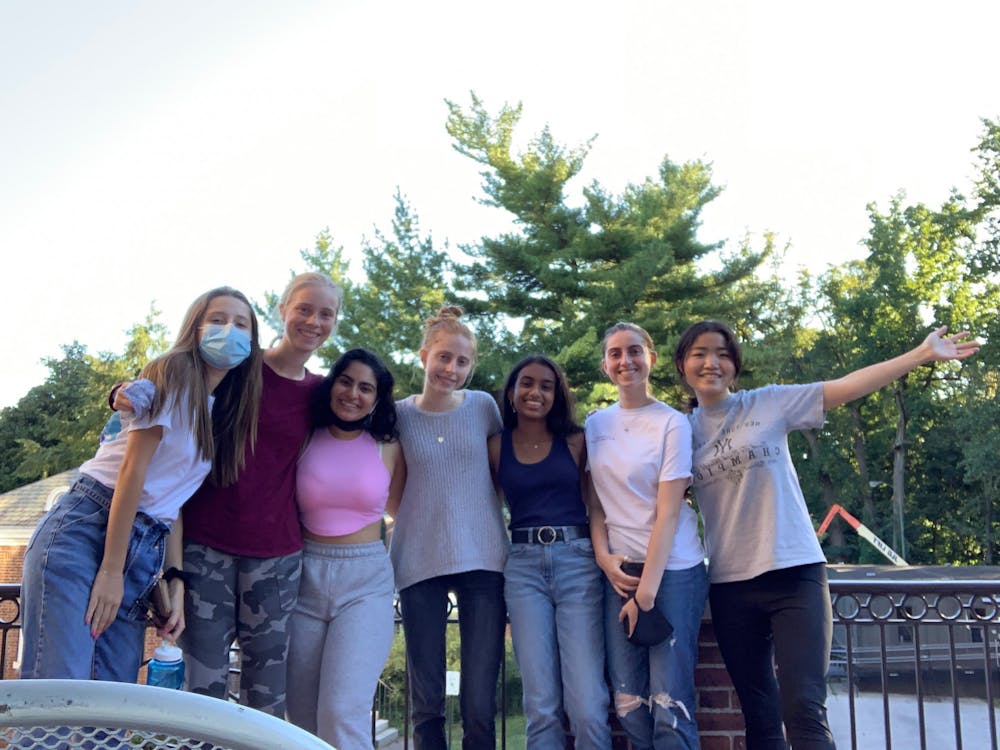Picture the AMR II communal kitchen: there’s three-day old leftovers in the fridge (not ours), a dirty pot in the sink (also not ours), freshmen flitting in and out to warm up ramen (couldn’t be us) and, finally, seven girls sitting at the table. We all just wanted to try Shirlene’s pasta.
And thus began our weekly Family Dinners.
Back then, Family Dinner was composed of stolen salad from the Fresh Food Café and whatever ingredients we could scrounge up from CharMar. Every week, a different combination of girls cooked in the one cast iron skillet we owned between us, and we rarely ever made enough food.
We’re happy to say we’ve leveled up since then, but the guidelines remain the same: no phones, no work, full presence. We all know Hopkins fosters a stressful environment, and it’s hard to find time to decompress. Often, we’re rushing between classes, exams and whatever other commitments we’ve pledged ourselves to, but Family Dinners are a mandatory time to put ourselves and our friendships first.
Each Family Dinner is unique — there is no other place where we can discuss the ramification of being stuck in a time loop (Yana is a non-believer, Shirlene will be in Paris), throw every vegetable known to man in the airfryer or do cartwheels in the hallway. All of this is only possible because we’re choosing to be intentional about each other and our time together. Add laptops and textbooks into the mix, and we would get something very different.
So now that we’ve gushed on about it, let’s explain “How to: Family Dinner”:
- Choose a time that works best for everyone — make a When2Meet if needed! It's so much easier to continue this ritual if you have a recurring time and place.
- Decide whose turn it is to cook, take turns and check in with each other. If someone is having a busy week, don’t force them to make dinner. This is supposed to be fun, not something that is overwhelming.
- Don’t forget to buy all the ingredients beforehand. This seems obvious, but you won’t believe how many times we’ve run to Streets Market to buy last-minute parmesan.
- Most importantly, make an unbreakable vow (joking, but do make it compulsory)
- Cook!
Tips:
- Try making dishes that can be made for a lot of people, like soups or pastas. It's cheaper and faster to cook in bulk.
- Clean up is for those who didn’t cook this week.
- For the first few weeks, remind each other in the group chat — keep each other accountable!
The conversations that come from these moments are core memories. It’s hard being away from home, and university can be isolating. But we are slowly creating our own home here — one made of different cuisines, contrasting flavors and the influences of six different time zones. Some of our favorite moments together as a group are crowding around the stove, half of us chopping mushrooms, the others washing dishes and yet more stirring the pot (not just the literal pot).
There was a recent New York Times article about the value of platonic friendships that one of our friends sent in our group chat. Though considered less powerful than romantic ones, platonic relationships support you, hold you up and love you. The article states: “There is magic in the moment when you realize you’ve found a friend like no other.” We’ve found magic in the quiet moments that make a dorm room kitchen feel like home.
While writing this piece, we tried to scroll through the group chat to find the first mention of Family Dinner, but we couldn’t find who decided to name these initially impromptu congregations. As such, for the past year and a half, we’ve thought of it as uniquely ours, and now we’re sharing it with you.
So if you’re struggling to find time for your friendships, make time. Be intentional with it. There’s value in studying together in Brody, but you'll find a different type of value in being present with each other outside of the academic environment. It’s hard to stop chasing productivity, but create a weekly commitment to your friends and watch how it transforms your university experience.





